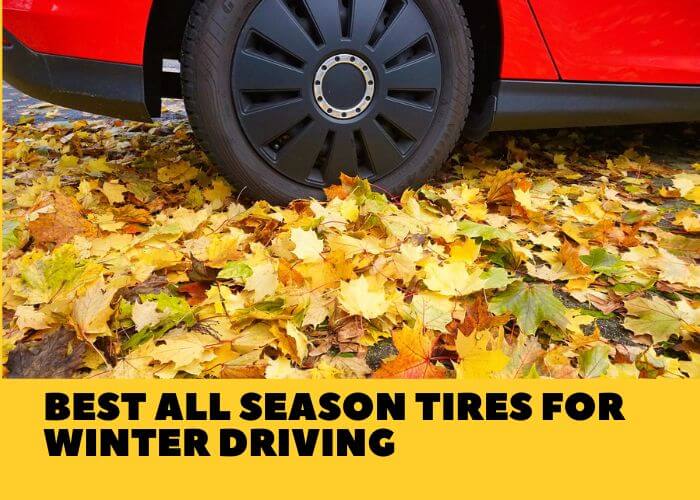Last Updated on April 15, 2023 by Mark S. Taylor
As the winter season approaches, it is important to ensure that your car is equipped with tires that provide safe and reliable performance in snowy and icy conditions. The decision to choose between winter tires and all-season tires can be a tough one as both have their own pros and cons.
As winter approaches, many drivers start to think about replacing their tires with ones that are better suited for colder and snowier conditions. While there are many options out there, all-season tires can be a great choice for those who want to avoid the hassle of switching between summer and winter tires. In this blog, we’ll take a look at some of the best all-season tires for winter driving and answer some frequently asked questions about them.
Winter tires, also known as snow tires, are specifically designed to provide maximum traction and grip in snowy and icy conditions. They are made with a special rubber compound that stays soft even in extremely cold temperatures, which allows them to maintain their grip on the road. Winter tires have deeper grooves and more

Contents
Best All-Season Tires for Winter Driving
Michelin CrossClimate 2 – This tire is designed to handle a wide range of weather conditions, including snow and ice. It features a V-shaped tread pattern that provides excellent traction on wet and snowy roads, as well as reinforced blocks that offer stability and grip in slushy conditions.
Continental ExtremeContact DWS06 – This tire is engineered to provide year-round performance, including in winter conditions. It features an asymmetrical tread pattern that provides excellent grip in both wet and dry conditions, as well as biting edges that provide traction in snow and ice.
Goodyear Assurance WeatherReady – This tire is designed to handle a variety of weather conditions, including winter conditions. It features a soy-based rubber compound that remains flexible in cold temperatures, as well as a directional tread pattern that provides excellent traction in rain, snow, and slush.
Bridgestone Potenza RE980AS – This tire is engineered to deliver high-performance handling in all seasons, including winter. It features a silica-enhanced compound that provides excellent wet and snow traction, as well as a unique tread design that offers improved handling and stability on dry roads.
Pirelli Cinturato P7 All Season Plus – This tire is designed to provide year-round performance, including in winter conditions. It features a tread pattern with 3D sipes that provide excellent traction in snow and ice, as well as a special compound that improves braking performance in wet and cold conditions.
Features of All-Season Tires for Winter Driving
All-season tires for winter driving typically feature the following characteristics:
Tread Design – All-season tires for winter driving typically have a tread design that is optimized for traction on snow and ice. This may include sipes (tiny slits) in the tread blocks, which can create more edges for gripping slippery surfaces.
Rubber Compound – The rubber compound used in all-season tires for winter driving is typically designed to remain flexible in cold temperatures. This allows the tire to maintain its grip on the road even when the temperature drops below freezing.
Tread Depth – All-season tires for winter driving typically have deeper tread depths than summer tires. This helps to improve traction on snow and ice.
Read More: The Best Tire Gauge For Car
FAQs about All-Season Tires for Winter Driving
Q: Are all-season tires suitable for winter driving?
A: Yes, all-season tires can be suitable for winter driving, as long as they are designed for it. Look for tires with the features listed above, including a tread design optimized for traction on snow and ice, a rubber compound that remains flexible in cold temperatures, and a deeper tread depth than summer tires.
Q: Do I need to buy winter tires if I have all-season tires?
A: It depends on where you live and how much snow and ice you typically encounter. If you live in an area with mild winters and only occasional snow and ice, all-season tires may be sufficient. However, if you live in an area with harsh winters and frequent snow and ice, winter tires may be a better choice.
Q: How do I know if my all-season tires are suitable for winter driving?
A: Look for the features listed above, including a tread design optimized for traction on snow and ice, a rubber compound that remains flexible in cold temperatures, and a deeper tread
Q: Can I use all-season tires in extreme winter conditions?
A: While all-season tires can handle moderate winter conditions, they may not perform as well in extreme winter conditions with heavy snow and ice. In such conditions, winter tires or studded tires may be a better choice.
Q: How often should I replace my all-season tires for winter driving?
A: The lifespan of all-season tires for winter driving depends on various factors, such as the quality of the tire, the driving conditions, and how frequently they are used. As a general rule, it is recommended to replace tires every 6 years, regardless of the miles driven. However, if you notice signs of wear or damage on your tires, such as cracks, bulges, or worn tread, you should replace them immediately.
Q: How do I properly maintain all-season tires for winter driving?
A: To ensure that your all-season tires for winter driving perform optimally, you should check the tire pressure regularly (at least once a month) and keep it at the recommended level. You should also rotate your tires regularly (every 6,000-8,000 miles) to promote even wear. Additionally, you should avoid overloading your vehicle, as it can cause extra stress on the tires.
In conclusion, all-season tires can be a great option for winter driving, provided they are designed for it. Look for tires with the appropriate features, such as a tread design optimized for traction on snow and ice, a rubber compound that remains flexible in cold temperatures, and a deeper tread depth than summer tires. Ultimately, the best tire for your needs depends on your location, driving habits, and budget, so be sure to do your research before making a purchase. And don’t forget to properly maintain your tires to ensure that they perform optimally and last longer.
